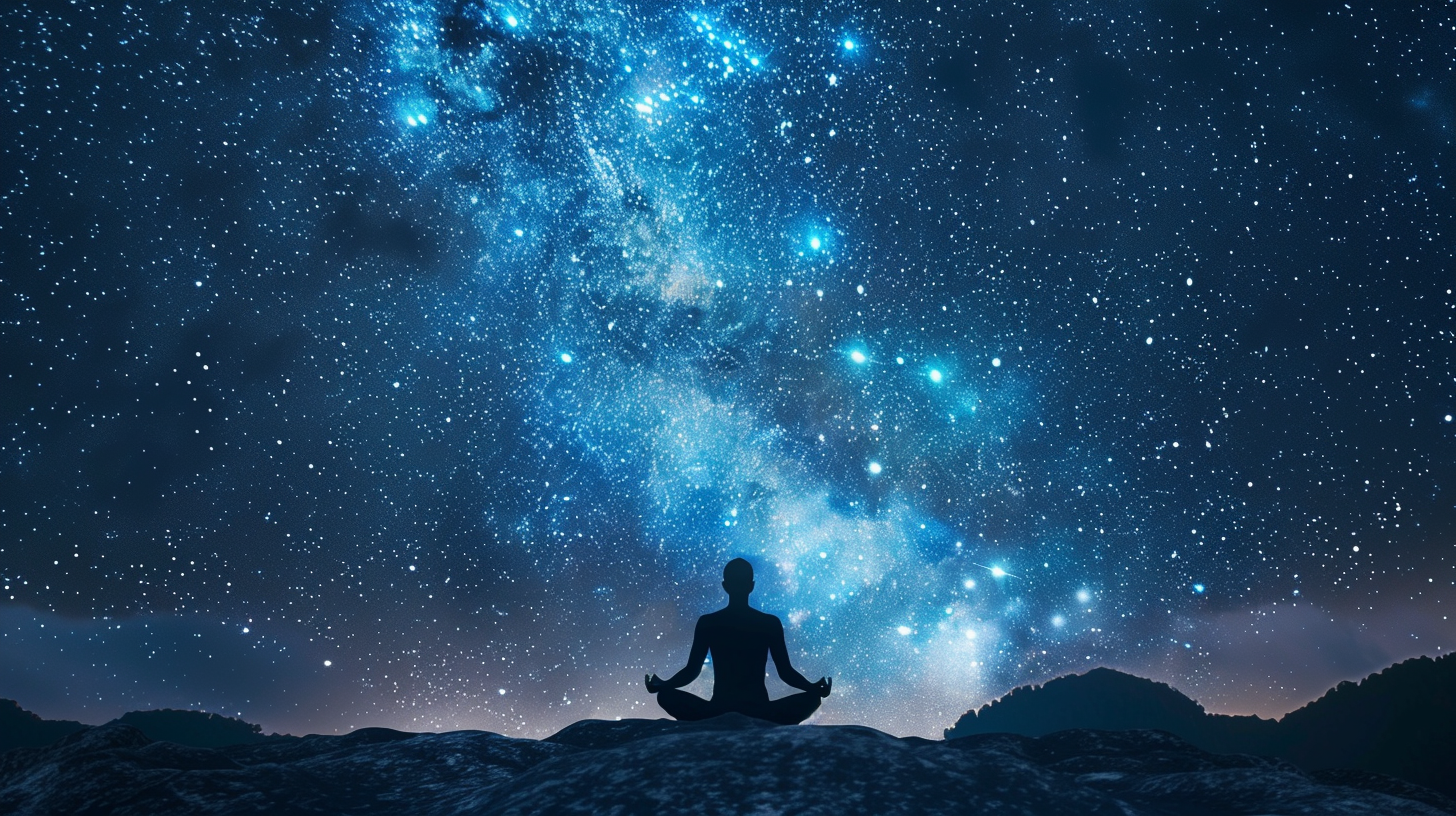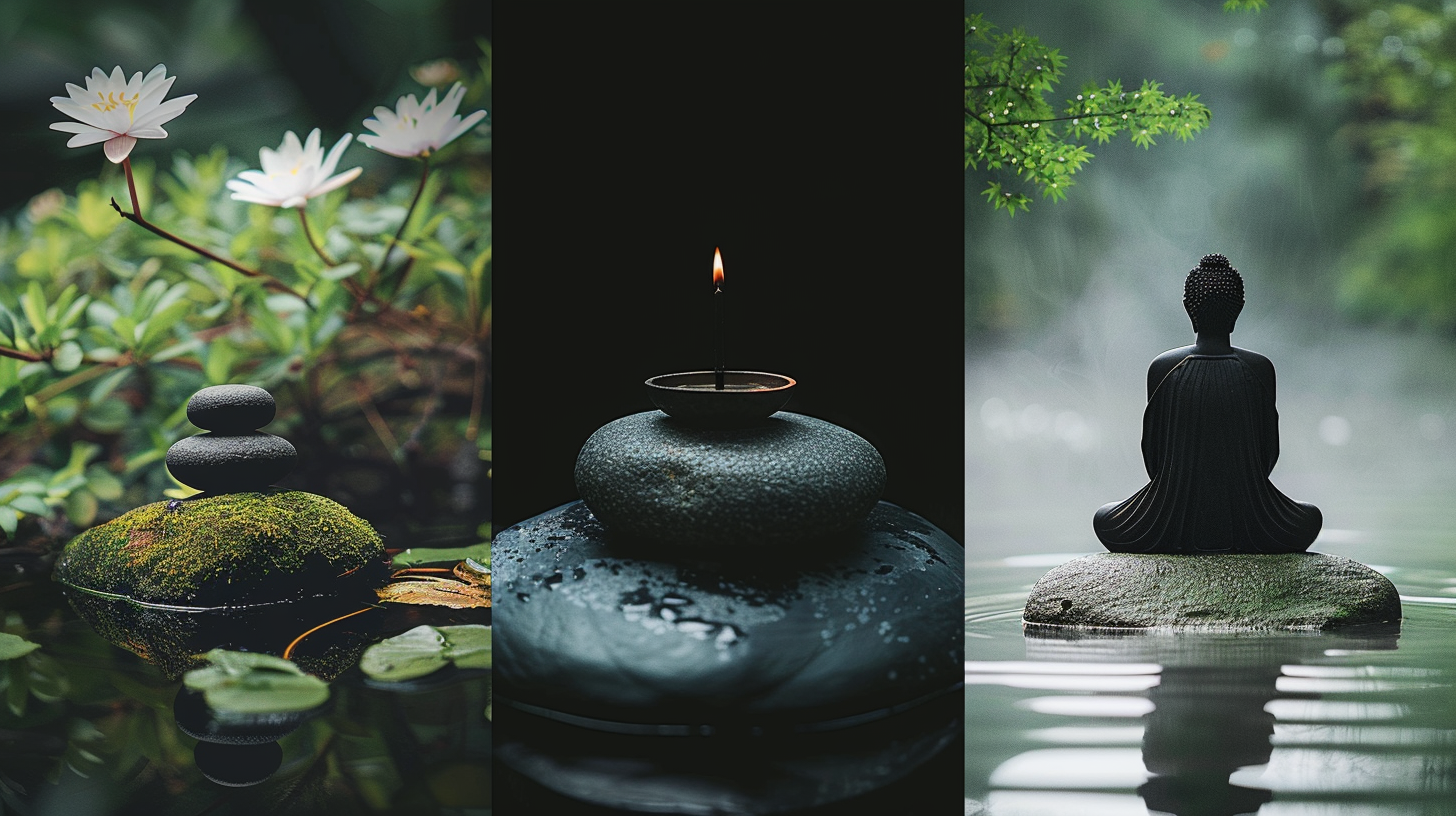Introduction

Welcome to the enigmatic world of higher consciousness—an expanse of inner reality that lies beyond the surface of everyday awareness. Have you ever wondered how deep the mind can travel or what lies beyond the upper limits of human perception? Meditation, a practice steeped in ancient tradition, has been transforming lives for centuries, offering a gateway to profound personal and spiritual growth.
Higher consciousness is not just a philosophical concept; it is a reachable state where you connect deeply with the essence of who you are and perceive the world in a more interconnected and insightful way. This state is pivotal not only for personal fulfillment but also for fostering a deeper sense of empathy and understanding towards others and the world around you.
Through meditation, you can unlock these elevated states of awareness. This guide will delve into various meditation techniques—each with its unique approach and transformative potential. From the focused silence of Zen to the liberating awareness of Vipassana, these techniques are not just practices but pathways to profound personal evolution.
As you board on this journey through the following sections, you will not only grasp the essence of higher consciousness but will also learn practical techniques to explore these elevated states yourself. Imagine the transformation waiting just beyond the horizon of your current self—greater peace, deeper insight, and a renewed sense of connection to the world. By the end of this guide, you’ll be equipped to begin this life-changing exploration, poised to unlock the full potential of your mind and spirit. Join us as we step forward into a detailed journey of self-discovery and personal enlightenment through the power of meditation.
What is Higher Consciousness?

Have you ever felt moments where your usual boundaries of self were transcended, where your awareness expanded far beyond the everyday? This profound experience is what many refer to as “higher consciousness” — a state where one perceives, understands, and interacts with the world in a more interconnected, enlightened way. But what exactly is higher consciousness, and how is it recognized across different spiritual and psychological realms?
In spiritual contexts, higher consciousness is often seen as a level of awareness that transcends the individual’s normal state of being. It is associated with significant spiritual awakenings and enlightenment, where one’s perception of life and existence expands dramatically. Psychologically, it can be described as achieving a heightened state of mindfulness and cognitive function, where one’s emotions and thoughts are observed from a place of detached awareness, promoting deep inner peace and mental clarity.
Throughout history, various cultures and civilizations have sought to understand and achieve this elusive state. In ancient Hindu scriptures, the pursuit of higher consciousness is articulated through practices like meditation and yoga, intended to unify the individual’s soul with the universal Brahman. Similarly, Buddhist teachings focus on achieving Nirvana—a state of liberation and freedom from suffering, which is another form of higher consciousness.
Philosophical figures such as Plato and Descartes discussed concepts akin to higher consciousness through their explorations of idealism and the nature of reality. Even in modern times, the dialogue continues with neuroscientists and psychologists exploring how brain functions correlate with states of expanded consciousness. Studies in neuroplasticity, for instance, show that regular meditation can rewire the brain to sustain higher levels of peace and clarity.
Diverse views from experts like psychologist Carl Jung, who introduced the idea of the collective unconscious, and contemporary neuroscientists like Sam Harris, who examines consciousness from both a scientific and meditative perspective, illustrate the convergence of spiritual wisdom and scientific inquiry in understanding this profound state.
Unlock Your Higher Consciousness: Transformative Meditation Techniques Revealed
The Role of Meditation in Achieving Higher Consciousness

Have you ever wondered how meditation could not only calm your mind but also expand your consciousness? This ancient practice, revered across various cultures and spiritual traditions, offers much more than a brief respite from the chaos of daily life. It holds the key to profound self-discovery and the attainment of higher consciousness, where your perception of life deepens and your sense of inner peace expands.
Meditation facilitates a deeper understanding of the mind by fostering an enhanced awareness of thoughts and emotions. The practice of mindfulness, a core element in many meditation techniques, involves observing your thoughts and feelings without attachment or judgment. This process cultivates a state of mental clarity and insight, allowing you to experience your true self beyond the incessant chatter of the mind.
Among the myriad of techniques that aid in reaching higher states of consciousness, three stand out for their depth and accessibility: Transcendental Meditation, Zen, and Vipassana. Each of these practices offers a unique path to the same destination—elevated awareness and a profound connection with the cosmos.
Transcendental Meditation (TM) involves the repetition of a specific mantra to settle the mind into a state of profound rest and relaxation, yet fully awake. This technique, popularized globally by Maharishi Mahesh Yogi, aims to transcend normal thinking processes and tap into a deeper level of consciousness.
Zen meditation, or Zazen, focuses on sitting in precise postures and observing the breath and mind to gain insights into the nature of existence. Its roots in Buddhist philosophy encourage practitioners to find enlightenment by looking inward, emphasizing rigorous self-restraint, meditation-practice, insight into the nature of mind, and the personal expression of this insight in daily life.
Vipassana, one of India’s most ancient techniques of meditation, means to see things as they really are. It focuses on the deep interconnection between mind and body, which can be experienced directly by disciplined attention to physical sensations.
Inspirational figures such as Thich Nhat Hanh and S.N. Goenka have shared profound insights gained from these practices. Thich Nhat Hanh once said, “Meditation is not an escape; it is a serene encounter with reality.” Similarly, Goenka emphasized the transformative power of Vipassana, stating it brings about a natural purification of the human mind. These insights and experiences from revered practitioners highlight how meditation can profoundly impact personal growth and spiritual enlightenment.
Step-by-Step Guide to Meditation Techniques for Higher Consciousness

Are you ready to embark on a transformative journey through meditation? Let’s dive into the practical steps to unlock deeper layers of your consciousness and achieve a serene state of mind.
Transcendental Meditation (TM)
Transcendental Meditation is a simple yet profound technique to settle the mind. It was popularized globally by Maharishi Mahesh Yogi and involves the silent repetition of a personalized mantra. To begin, choose a quiet and comfortable place where you won’t be disturbed. Sit with your back straight and eyes closed. Gently start repeating the mantra provided by a certified TM teacher in your mind. Let the mantra flow at whatever pace feels most natural. Remember, the goal is effortlessness. The process should not involve concentration but rather allowing thoughts to come and go.
Zen Meditation (Zazen)
Zen meditation requires you to adopt a precise posture. Find a quiet spot and sit on a cushion or chair. Cross your legs comfortably, with hands folded together in your lap. Straighten your back, tilt your chin slightly downward, and half-close your eyes, letting your gaze fall gently on the ground about two to three feet in front of you. Focus on your breathing, counting each breath from one to ten. When you reach ten, start again. If distractions arise, acknowledge them, but gently bring your focus back to your breathing.
Vipassana Meditation
Vipassana, or insight meditation, focuses on the deep interconnection between mind and body, which can be experienced directly by disciplined attention to physical sensations. Sit in a quiet and comfortable place, close your eyes, and begin to focus on your natural breathing pattern. Gradually, shift your attention from your breath to sensations in your body, scanning from the top of your head to your toes. Observe these sensations without attachment, recognizing their impermanent nature.
Throughout your practice of these techniques, remember the words of the Dalai Lama: “The goal is not to better yourself. The goal is to chip away all that is not yourself.”
As you explore these techniques, you may encounter challenges such as distraction, frustration, or impatience. These are normal. Acknowledge them and return to your practice with gentleness. Consistency is key to deepening your meditation practice and achieving higher consciousness.
Why not begin today? Start with a few minutes each day, and gradually increase your time as you feel comfortable. Keep a meditation journal to track your progress and insights. This simple tool can become a profound part of your journey toward higher consciousness.
By consistently practicing these meditation techniques, you will notice subtle shifts in your awareness and mental clarity. Embrace these changes, and let them guide you toward a deeper understanding of yourself and the world.
Integrating Meditation into Daily Life

Incorporating meditation into your daily life might seem challenging at first, but with a few simple adjustments, you can create a sustainable practice that not only fits your schedule but also profoundly enriches your life. Let’s explore how you can seamlessly integrate this transformative practice into your everyday routine and unlock its myriad benefits.
Building a Sustainable Meditation Routine
To establish a lasting meditation practice, start by setting realistic goals. If you’re new to meditation, begin with just five minutes a day. As you grow more comfortable, gradually increase the duration. The key here is consistency rather than length; it’s more beneficial to meditate for a short time each day than to do longer sessions sporadically. Identify times in your day that consistently work best for meditation—perhaps in the morning to set a positive tone for the day or in the evening to unwind before bed.
Creating a Conducive Environment
The space where you meditate can significantly affect the quality of your practice. Select a quiet corner of your home that you can dedicate to your meditation. Enhance this space with elements that promote calm, such as plants, comfortable cushions, or soothing wall colors. Consider the auditory environment as well—some prefer the natural ambience of their surroundings, while others might find gentle, soothing background music or white noise helpful. It’s also important to minimize distractions: inform your family of your meditation schedule to ensure privacy and turn off any electronic devices that could interrupt you.
The Importance of Consistency and Patience
Like any skill, meditation requires regular practice and patience. Consistently dedicating time to meditation can profoundly impact your stress levels, enhance your clarity of thought, and promote emotional stability. Remember, the journey to higher consciousness is a gradual process, filled with personal insights and transformations. Each session builds on the last, deepening your understanding of your mind and enhancing your overall well-being.
Embracing the Meditation Journey
As you integrate meditation into your daily routine, embrace the journey with an open heart and patience. Understand that some days will be easier than others and that progress might seem slow at times. Celebrate the small victories—perhaps noticing a moment of clarity or feeling a bit more relaxed after a session. These are signs that you’re moving in the right direction.
Meditation is more than just a practice—it’s a pathway to a deeper understanding of your life and a tool for profound personal transformation. By making meditation a vital part of your daily routine, you are setting the stage for a richer, more conscious experience of your own life. Stick with it, be patient with yourself, and let your meditation journey unfold naturally.
Case Study and Success Story

In our exploration of the profound impact of meditation on personal and professional growth, let’s delve into the inspiring story of Lucila Voloschin, whose journey through meditation exemplifies transformation.
Lucila Voloschin’s Transformation Through Meditation
Lucila began her meditation journey during a time of personal upheaval. Faced with high stress and the challenges of daily life, she turned to meditation as a refuge and a means to reclaim her inner peace. What started as an experiment grew into a cornerstone of her daily routine.
Through consistent daily practice, Lucila noticed significant shifts in her perspective and well-being. She realized that her actions, thoughts, and feelings significantly influenced her reality. This awareness empowered her to adopt a more positive and optimistic outlook, bringing about changes that resonated throughout her life. Lucila found that by accepting things she could not change, she freed herself from many of the stresses that had weighed her down. This acceptance brought newfound freedom and opened her eyes to new opportunities.
One of the most notable transformations was in her creativity. Meditation unlocked her imaginative potential, allowing her to solve problems with ease and embrace challenges with a fresh perspective. Her increased confidence and self-trust shone through, helping her make decisions that felt true to her inner self.
Lucila’s professional life also flourished. Her enhanced focus and clarity led to increased productivity and the ability to engage with her work more meaningfully. The personal satisfaction this brought was mirrored in improved relationships with colleagues and a more harmonious work environment.
Her story is a powerful testament to the transformative potential of meditation—not just as a practice for personal introspection but as a tool for profound life change. Lucila’s experience illustrates that with dedication and consistency, meditation can lead to a higher state of consciousness and a happier, more fulfilling life.
This narrative not only serves as a motivation for those on the fence about incorporating meditation into their routine but also underscores the attainable nature of such transformations through mindfulness and dedication.
Frequently Asked Questions
Do you have questions about how meditation can lead to higher consciousness? You’re not alone. Here, we address some of the most common queries to help clear the path for your journey.
Common Questions About Meditation and Higher Consciousness
What is the best time of day to meditate for higher consciousness?
The best time to meditate can vary by individual preferences and schedules, but many find early morning or late evening to be ideal as these times are generally quieter and involve fewer distractions. The key is consistency and finding a time when you can be most present and undisturbed.
How long should I meditate to experience changes?
While the duration can vary widely among practitioners, starting with as little as 5-10 minutes daily can be beneficial. Gradually increasing the time as you become more comfortable can help deepen your practice. Consistency is more critical than duration in achieving long-term benefits.
Can meditation improve my emotional well-being?
Yes, numerous studies have shown that regular meditation can significantly improve emotional well-being by reducing stress, anxiety, and depression while enhancing overall mood and resilience. Meditation helps by creating a state of relaxation and promoting a calm, clear mind.
What are the signs that I am achieving higher consciousness through meditation?
Signs of reaching higher consciousness include increased awareness of your thoughts and actions, a greater sense of inner peace and balance, enhanced empathy and understanding towards others, and a feeling of connectedness with the world.
Long-Tail Search Queries
What meditation techniques are best for accessing higher states of consciousness?
Techniques like Transcendental Meditation, Vipassana, and mindfulness meditation are particularly effective for accessing deeper states of consciousness. Each technique focuses on transcending the usual mental chatter and reaching a state of pure awareness.
Are there any physical health benefits to meditating for higher consciousness?
Yes, meditation is known to offer several physical health benefits, including reduced blood pressure, improved immune function, and lower cortisol levels, which contribute to stress reduction. Regular practice can lead to significant improvements in overall physical health.
As you continue to explore the profound impacts of meditation, remember that the journey to higher consciousness is personal and constantly evolving. Feel encouraged to dig deeper and ask more questions as you progress. Your path may be challenging, but with regular practice and patience, the benefits can be transformative. Keep exploring and allow your practice to grow and adapt with your experiences.
Conclusion

As we conclude our journey through the realms of meditation and higher consciousness, let us revisit the profound insights and practices that have illuminated our path.
Throughout this article, we’ve explored the multifaceted concept of higher consciousness, discussing its significance not only in personal growth but also in our broader spiritual journey. We delved into various meditation techniques including Transcendental Meditation, Zen, and Vipassana, each offering unique pathways to access deeper states of awareness. These practices are more than methods for relaxation; they are gateways to expanding our consciousness and enhancing our intuitive faculties.
We also provided practical advice on integrating meditation into daily routines. Consistency in practice and creating a conducive environment are crucial for nurturing the seeds of mindfulness in the clutter of daily life. We’ve seen through shared case studies how transformative these practices can be, affecting profound changes in both personal and professional spheres of life.
I encourage you to view meditation not just as a practice but as a transformational journey towards self-discovery and spiritual enlightenment. Engage with each session not just as a moment of peace but as a step towards greater self-awareness and connection with the universe.
Please share your own experiences with meditation in the comments or on social media, and join our community of like-minded individuals. Engage further by signing up for our newsletter, participating in workshops, and exploring additional content on our website to deepen your understanding and practice.
As you continue to explore the depths of your mind and spirit through meditation, remember that each moment of mindfulness brings you closer to the serenity and clarity that higher consciousness offers. This path is one of continuous discovery and growth—may your journey be fruitful and enlightening.







